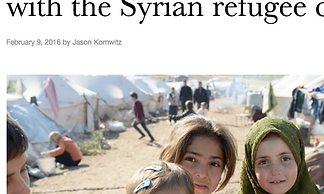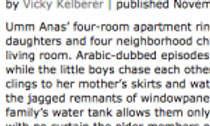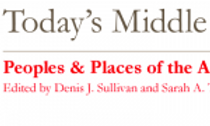BCARS Publications Archive
Explore the archive of BCARS publications, from Fall 2014 to Spring 2016.
NGO Governance and Syrian Refugee "Subjects" in Jordan
Spring 2016 - Former BCARS Assistant Director and current Brown University Professor Dr. Sarah Tobin's latest article on the Za'atari Syrian Refugee camp.
The typical image of the Syrian refugee camp in Jordan is one of suffering. Journalistic account after account introduces spectacular stories of devastation and loss. While perhaps dramatized, these tales are not false. Syrian refugee camps have forced hundreds of thousands of strangers to live together in austere, unequal and artificially constructed communities, which are subject to new national laws. To live in the camps is indeed to endure or have endured some form of suffering—but also to be part of a collective of survivors.
Oasis in the Desert? Coproduction and the Future of Zaatari
Spring 2016 - From the summer of 2012 through 2014, there were rapid influxes of refugees from Syria into the Zaatari camp in Jordan. The camp’s population spiked in early 2013—from 56,000 in January to a peak of 202,000 just four months later—overwhelming the UN High Commissioner for Refugees (UNHCR) and Jordanian government officials who were trying to maintain order. Such runaway growth would have been difficult to manage in an established city in a developed state, much less an ad hoc community of tents in the desert.
Putting Refugee Work Permits to Work
Spring 2016 - For decades, humanitarian experts and international organizations have called upon host countries to give more work permits to refugees. Permits are posed as a way to alleviate the poverty of refugees and lessen their dependency on aid. Host countries have traditionally shunned the notion, however, fearing the creation of permanent populations of refugees in competition with citizens for jobs. Most host countries, in fact, have done the opposite, blocking access to work and deporting refugees found working illegally.
Journey Behind a Name: Reviving Circassian Mythology
...My name is not only non-Arab, it is also pagan. In Jordan, an Arab and predominately Muslim country, it is a simple reflection of the diverse ethnic and religious groups; Armenian Christians, Arab Christians, Muslims Chechens and Circassians and others that make up Jordan’s colorful social fabric. Pulled out of a book about ancient mythology of the Caucuses by my mother, my name carried me through a journey to dig deeper into my ancestral homeland and my Circassian roots...
Students up close and personal with the Syrian refugee crisis
February 9, 2016 - "...'We did what we could at the time,” political science professor Denis Sullivan recalled, “and students got an up-close and personal look at the crisis.” But Sullivan, who was leading the dialogue, was not satisfied, knowing that much more could be done to transform the lives of the displaced. He had led a dialogue to Jordan in each of the past three years, watching closely as more and more refugees flooded into the country. And now he was motivated to tackle the worst humanitarian crisis in the world today, a crisis that has claimed some 4.6 million victims..."
Responding to the Global Migration Crisis through Local Innovation
November 28, 2015 - ...Horrific terrorist attacks on November 13th in Paris shook people across the globe, and in Boston many of us were reminded of the 2013 Marathon attacks as we proclaimed our solidarity with the French people. Yet as reports surfaced that one of the eight attackers in Paris may have disguised himself as a Syrian refugee to gain access to Europe, another reaction gained prominence: fear...
Seeking Shelter in Jordan’s Cities
November 5, 2015 - ...Umm Anas’ four-room apartment rings with the muffled laughter of children told to hush. Her six sons and daughters and four neighborhood children huddle around a tiny, rickety television in the otherwise unfurnished living room. Arabic-dubbed episodes of the “How to Train Your Dragon” television series play in the background...
The Ongoing, Steady Gains of Morocco’s Islamist Party
September 29, 2015 - ...Moroccans took to the polls on 4 September to vote in the first local elections since 2009. A total of about one hundred forty thousand candidates competed for around thirty-two thousand seats. These local elections were the first to take place after the new constitution in 2011, which the monarch effectively used as a way to steal the 20 February Movement’s thunder and calm the protests by seemingly giving in to some of the protestors’ demands...
Citizen Survey Gauges Boston’s Interest in Hosting Syrian Refugees
September 11, 2015 - ...In response to the flood of Syrian refugees in Europe, President Obama has announced the U.S. will take in at least 10,000 displaced Syrians in the next year.In Massachusetts, both Boston Mayor Marty Walsh and Gov. Charlie Baker have suggested they’re open to a conversation about accepting more refugees locally, but Baker wants to know who will pay for relocation...
Not Likely to Go Home: Syrian Refugees and the Challenges to Turkey and the International Community
September 2015 - ...Since October 2013, when we first visited Turkey to research the extent and impact of the Syrian refugee crisis on the country, the scale of displacement has increased dramatically. At that time there were around 2 million refugees in Jordan, Lebanon and Turkey. Today this figure has climbed to more than 4 million while estimates of the number of internally displaced persons (IDPs) have increased from around 4.2 million to 7.6 million...
Community Policing Findings
...Syrian refugees are beginning to develop concerns about civil liberties for long-term residency, employment, housing, and other legal protections. Numerous case studies show that as refugees’ condition transitions from ‘situational’ to ‘state-in-exile,’ the propensity for civil unrest increases and overwhelms policing capacities...
10 Things You Can Do From Boston To Help Refugees
September 9, 2015 - ...On Friday, I overheard two Sox fans headed to Fenway Park earnestly discussing refugees. They expressed sorrow over the image of Aylan Kurdi circulating on social media, and wished aloud they could do more to help. While more than 5,000 miles may separate Boston and Damascus, the heart of the Syrian refugee crisis, there are concrete steps people can take locally to have an impact on the lives of refugees...
No Place to Call Home: Government of Jordan Blocks Shelter Projects for Syrian Refugees
...Mohammed cannot afford the necessary upgrades to his home because he is one of the nearly 630,000 Syrian refugees currently residing in the Hashemite Kingdom of Jordan. Of these refugees, 85 percent live outside of the country's refugee camps, and 99 percent lack a permit to work legally. Known as urban refugees, the greatest challenge they face when they arrive in Jordan's cities and towns is securing access to adequate and affordable shelter, especially without a legal source of income...
Status-less in Cyber City
Summer 2015 - ...When refugees from the Syrian war first began to stream into Jordan, the Jordanian Ministry of Interior registered the newcomers and placed them in the care of families, under the kafala system, mainly in the capital of Amman. The kafala or guardianship system has roots in Bedouin customs, but in modern times the term refers to how many Arab states handle migrant workers...
Syria’s Humanitarian Crisis: A Call for Regional and International Responses
January 2015 - ...On October 31, 2014, the Boston Consortium for Arab Region Studies (BCARS) hosted a workshop for scholars, policy analysts, and program implementers to discuss the impacts of Syria’s refugee crisis on the region and the international community. We asked ourselves: “What can we learn from the refugees, those providing aid, and those providing funds, to help ameliorate the situation, now and into the future?”...
The State of Higher Education in Iraq: Lessons from Eight Iraqi Fulbright Scholars
Fall 2014 - ...On September 3, 2014, the Boston Consortium for Arab Region Studies (BCARS) hosted a unique workshop featuring eight Iraqi Fulbright visiting scholars, all graduates of various Iraqi institutions of higher education. These eight Fulbright Scholars spent the summer in Boston and were based at Salem State University. The scholars were selected to participate in the Fulbright program at Salem State from a pool of over 300 candidates across Iraq...
Obama’s Middle East Headaches
December 2014 - ...More than any president in recent memory, Obama has insisted on thinking through the consequences of the use of US power. His basicresponsibility is to protect America and Americans, and he has not hesitated to act on this principle. Consider his profligate use of drones over Pakistan and Yemen against al-Qaeda-linked groups...
Understanding Today’s Middle East People & Places of the Arab Spring
September 2014 - ...In April 2014, our first Graduate Student Conference brought together nineteen emerging scholars whose research is exploring “today’s Middle East.” The conference sought to illuminate why the uprisings took place where and when they did, what impact external actors had (and continue to have) on the Arab Spring, and whose voices are being heard—or lost—as events continue to evolve and unfold. We are proud to present the work of seven of these scholars here...


















